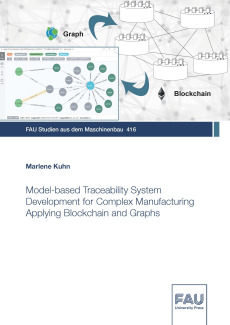Marlene Kuhn
Model-based Traceability System Development for Complex Manufacturing Applying Blockchain and Graphs
Reihe: FAU Studien aus dem MaschinenbauTraceability systems are the key enablers to smart manufacturing, as they provide transparency and structured documentation along with a product’s value generation flow. With rising regulatory and organizational requirements, traceability systems have developed from a pure risk mitigation tool to an essential pillar of the data revolution in the context of Industry 4.0. Especially in the automotive industry, recall costs are growing exponentially with particularly high growth rates for electrified and autonomous vehicles. A traceability system helps to reduce these costs through a more targeted containment of the recalls.
This thesis presents a modeling methodology to systematically develop traceability in manufacturing industries. In alignment with the proposed methodology, a traceability model for complex manufacturing systems is developed. The model builds on a standardized traceability terminology consisting of trace objects, trace links, trace actors as well as tracking and tracing functions, and encompasses manufacturing data and supply chain data. The model is implemented for an automotive use case through a holistic application based on a graph database and a blockchain. The graph database allows to connect and store semantically rich and detailed manufacturing data, while the Ethereum-based permissioned blockchain enables tracing macro data for products as they move through the supply chain. The developed solution thus provides full transparency and safe documentation to complex and opaque production networks.
Rückverfolgbarkeitssysteme sind der Schlüssel zu einer intelligenten Fertigung, da sie für Transparenz entlang der Wertschöpfungskette sorgen und eine strukturierte Dokumentation der Produkthistorie ermöglichen. Mit den steigenden regulatorischen und organisatorischen Anforderungen haben sich Rückverfolgbarkeitssysteme über die letzten Jahre von einem Instrument zur Risikominimierung zu einer wesentlichen Säule der Datenrevolution im Kontext von Industrie 4.0 entwickelt. Insbesondere in der Automobilindustrie steigt ihre Bedeutung an, da das Rückverfolgbarkeitssystem es ermöglicht, die Kosten durch eine gezieltere Eingrenzung der Rückrufe zu reduzieren und die Sicherheit der Produkte durch eine schnelle Fehlersuche zu gewährleisten.
In dieser Arbeit wird eine Methodik zur systematischen Modellierung von Rückverfolgbarkeitssystemen vorgestellt. Das entwickelte Modell baut auf einer standardisierten Terminologie auf, die aus Trace Objekten, Trace Links, Trace Akteuren sowie Tracking und Tracing Funktionen besteht, und umfasst sowohl Produktions- als auch Lieferkettendaten. Basierend auf einer Graphdatenbank und einer Blockchain wird das Modell für einen Anwendungsfall aus der Automobilindustrie spezifiziert und ganzheitlich implementiert. Die Graphdatenbank ermöglicht die Verknüpfung semantisch angereicherter und detaillierter Fertigungsdaten, während die Ethereum-basierte Blockchain-Lösung Daten über verschiedene Produktionsstandorte hinweg vernetzt und aggregiert.
Produktinformationen
182 Seiten , Format 17,0 x 24,0FAU University Press
Paperback
32,50 € inkl. MwSt.
Erscheinungsdatum
Januar 2023
Kategorie: Technik
